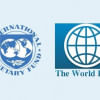Currency swap pushes forex reserves above $20b

Bangladesh's foreign currency reserves have gone past the $20-billion mark after nearly a month thanks to the currency swap initiated by the central bank.
The forex reserves stood at $20.19 billion on February 20, up from $19.94 billion a week ago, data from the Bangladesh Bank showed.
The international currency holding was $20.03 billion on January 24 and hovered around $19 billion for a month since then.
The slight increase in the reserves came a week after the BB introduced the currency swap with banks in order to meet the net reserve condition set by the International Monetary Fund (IMF) with its $4.7 billion loan programme.
Under the currency swap deal, commercial banks can take the local currency in exchange for the US dollar with the central bank for a tenure ranging from seven days to 90 days.
The BB has secured around $235 million from nearly 10 banks under the swap deal since its introduction, said a senior official of the central bank seeking anonymity.
The central bank has also kept selling US dollars from its reserves only for settling the import bills of state-run enterprises.
The BB official said that commercial banks are interested in currency swaps as it will reduce their liquidity pressure and allow them to get back their US dollars when needed.
"Currency swaps with commercial banks are positively impacting the forex reserves," said BB Executive Director and Spokesperson Md Mezbaul Haque.
Syed Mahbubur Rahman, managing director of Mutual Trust Bank, thinks both the BB and commercial banks will benefit from the swap initiative.
"It will boost the forex reserves. At the same time, it will also reduce the pressure on the forex market."
In the post-pandemic period in 2021, the country's import payments started to rise faster than remittance earnings and exports, prompting a shortage of US dollars at banks.
The forex crisis intensified in the middle of 2022 due to the price increase of essential goods and other commodities in the global market because of the supply chain disruption caused by the lingering impacts of the pandemic and the Russia-Ukraine war.
In order to help banks settle record import bills, the central bank pumped more than $28 billion into the banking sector from its reserves, a development that caused the reserves to halve in just two years.
Owing to the sharp fall in the reserves, Bangladesh failed to meet the IMF target of keeping $17.78 billion as the minimum net international reserve as of December 31.
Industry people, however, think the forex crisis will ease soon as merchandise exports rebounded strongly in January after manufacturers shipped goods worth $5.72 billion, the highest in a single month. Suppliers are also hoping to retain the momentum in the coming months.
Similarly, the remittance flow rose to a seven-month high in the month.

 For all latest news, follow The Daily Star's Google News channel.
For all latest news, follow The Daily Star's Google News channel. 







Comments